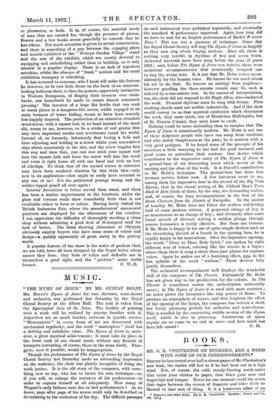MUSIC.
"THE HYMN OF JESUS." BY MR. GUSTAV HOLST. Mn. HOIST'S Hymn of Jesus for two choruses, semi-chorus and orchestra, was performed last Saturday by the Royal Choral Society at the Albert Hall. The text is taken from the Apocryphal Acts of St. John. The futility of praising such a work will be realized by anyone familiar with it. Adjectives are so much lumber, outworn in ignoble service. " Masterpieces " in every form of art are discovered with mechanical regularity, and the word " masterpiece " itself has a shifting and indefinite value. The Hymn of Jesus is, more- over, a great mystical achievement ; it must take its place in the front rank of our choral music without any flourish of trumpets (excepting, of course, those in the score itself). Pane- gyric, were it possible, would be inappropriate.
Though the performance of The Hymn of Jesus by the Royal Choral Society last Saturday made an astounding impression on the audience, the choir was plainly incapable of doing the work justice. It is the old story of the composer, with some- thing new to say, who has to create his own technique—or, if you will, to enlarge the resources of his predecessors—in order to express himself at all adequately. How many of , Wagner's early failures were -due to bad performances ? As we know, page after page of his scores could only be described as devastating to the orchestras of his day. The difficult passages on each instrument were published separately, and eventually the standard If performance improved. Again, how long did we have to wait for an English performance of Bach's B minor Mass? This too was a question of technique. Some day the Royal Choral Society will sing The Hymn of Jesus as happily as they now sing about forging anchors. After all, there is nothing very terrible in rhythms of five and seven beats. Awkward intervals have been sung before the year of grace 1922; and, before The Hymn of Jesus was written, there were orchestral accompaniments that occasionally tempted one to sing the wrong note. It is not that Mr. Hoist writes incon- siderately for the human voice. He knows far too much about his art to do that. To borrow an analogy from pugilism— however gruelling the three-minute rounds may be, each is relieved by a one-minute rest. In the matter of interpretation, too, the choir did not respond to Sir Hugh Allen, who conducted the work. Frenzied rhytIms must be sung with frenzy. Firm crashing chords must not wobble indecisively. And if the choir would convey to us that mystical exultation which dominates the work, they must think, not of Handelian Hallelujahs, but of St. Francis d'Assisi, they must learn to exult.
Nothing could be more misleading than to imagine that The Hymn of Jesus is sensationally modern. Mr. Hoist is not one of those desperate people who have run away from tradition and who shriek blasphemies at the past; he is modern with a very good pedigree. If he found some of the precepts of his ancestors a little wearying he has had the good manners and good sense to assimilate their wisdom. One device which contributes to the impressive unity of The Hymn of Jesus is a ground-bass of six descending notes which occurs at the opening and the close of the work. It is Purcell's contribution to Mr. Hoist's technique. The ground-bass has done him yeoman service before now. A few instances occur to me, among them the impressive bass in the second of the Rig Veda Hymns, that in the choral setting of Mr. Clifford Bax's Turn Back 0 Man (both of these, by the way, are descending scales), and, of course, the harp accompaniment in the first of the Seven Choruses from the Alcestis of Euripides. In the matter of tonality Mr. Hoist does not follow the restless red-herring trail of some modern writers. A perpetual change of key is as monotonous as no change of key ; and obviously after some broad stretch of diatonic writing a sudden plunge through remote harmonies is trebly effective. But these are truisms. If Mr. Hoist is happy in his use of quite simple devices such as the electrifying discord of a fourth in the opening bars, he is equally happy in his innovations. After the impressive opening, the words "Glory to Thee, Holy Spirit," are spoken by eight different sets of voices, entering like the stretto in a fugue; above them there is sung a short three-part phrase for soprano voices. Again he makes use of a humming effect, ppp, in the last syllable of the word "wisdom." These devices fully justify themselves.
The orchestral accompaniment well displays the wonderful skill of the composer of The Planets. Fortunately Mr. Hoist has not given way to his predilection for the celesta. In The Planets it sometimes makes the orchestration unbearably sweet ; in The Hymn of Jesus it is used with more restraint ; its notes pierce the harmonies like tiny points of flame. To produce an atmosphere of repose, and thus heighten the effect of the opening of the hymn, the composer has written a short but lovely plainsong prelude for orchestra and semi-chorus. This is recalled by the contrasting middle section of the Hymn itself, which is also in plainsong. Limitations of space require me to come to an end at once—and how much has


































 Previous page
Previous page